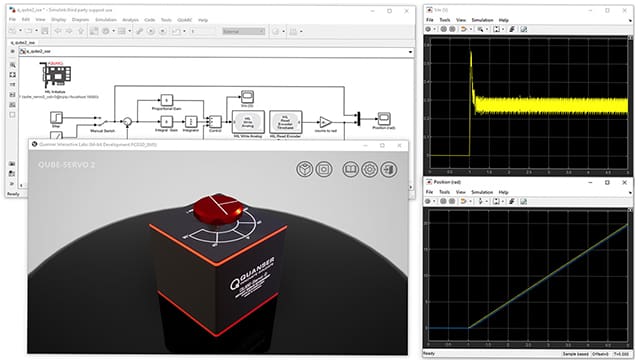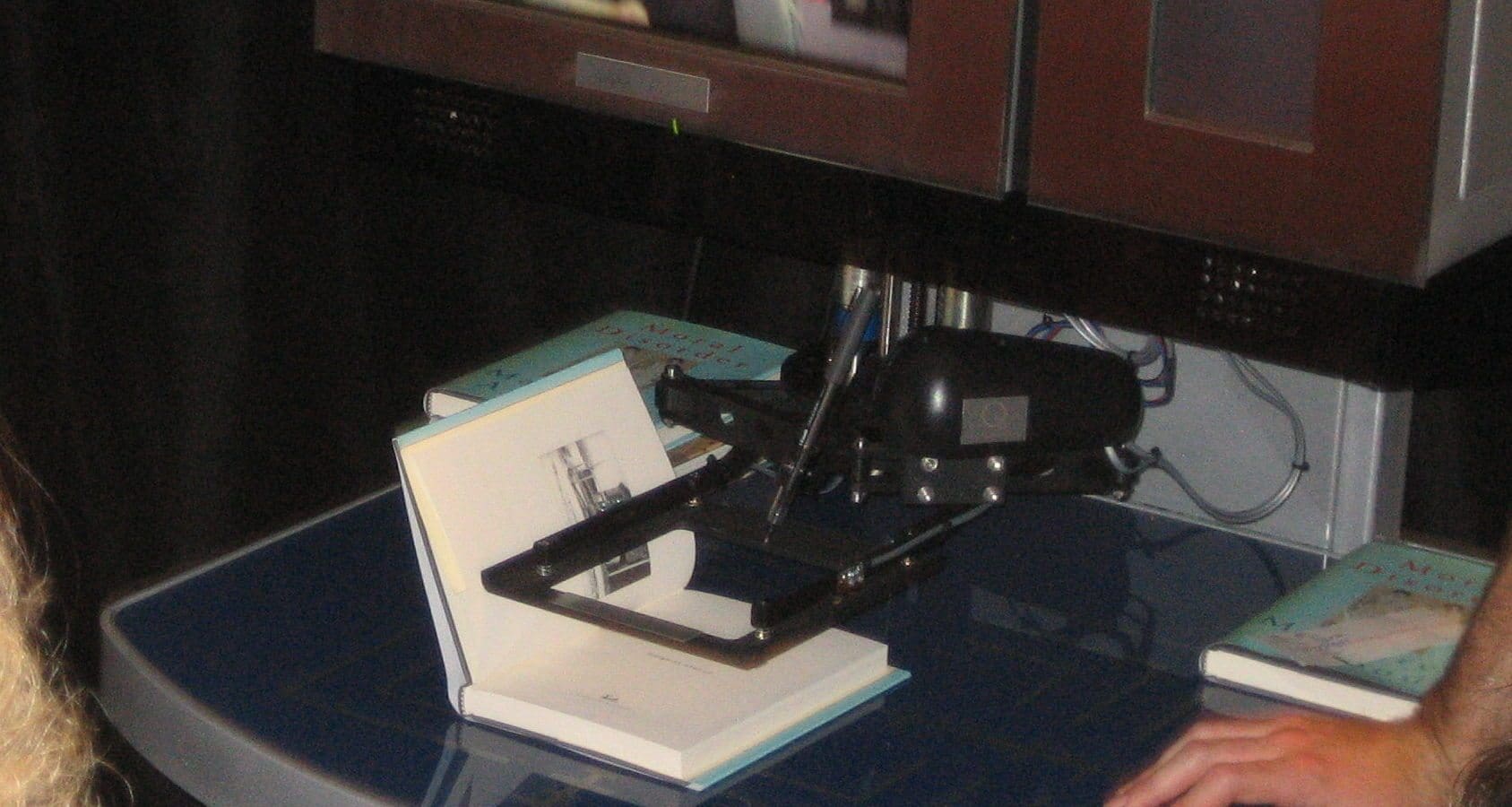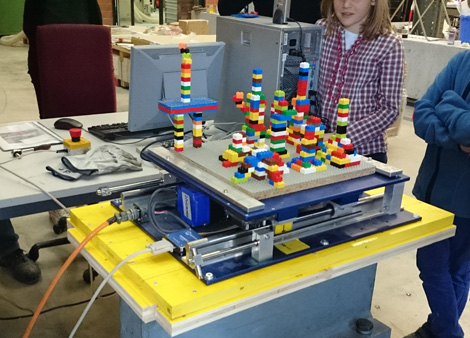
In the wake of the COVID-19 pandemic, universities around the globe were faced with the daunting task of offering meaningful hands-on laboratories to students, albeit remotely. McMaster University, a preeminent public research university located in Hamilton, Ontario, Canada, was particularly impacted by the disruptions caused by the pandemic. With over 1500 students, McMaster’s Walter G. Booth School of Engineering Practice prides itself on offering a range of student-centred experiential learning programs. With hands-on learning at its core, the pandemic disrupted most laboratory activities of the school, including Dr. Mostafa Soliman’s, who had to find an alternative method to provide practical experience to his control theory class. However, Dr. Soliman was not alone, as many professors around the world reached out to Quanser looking for assistance on delivering their courses remotely. The Quanser R&D team began to immediately leverage our software IP and stepped up to the challenge to develop virtual twins of our most popular platforms to offer our educational partners, including Dr. Soliman, the ability to offer close enough – if not identical – virtual laboratory experiences to students.
Challenge
A Theory Intensive Course with a Hands-on Component
Control Theory I (PROCTECH 3CT3) is a 3-unit course, which covers classical control theory topics such as analysis and design of closed loop control systems, including system characteristics and performance, stability analysis, system types, performance improvement, compensation, filtering, and motion system tuning. Controller programming and hardware implementation are integral parts of the course and naturally one of the learning outcomes. The course consists of three lectures and a 3-hour laboratory session.
Labs Pre-Pandemic
Prior to the current pandemic, the lab component of the course used a standard analog motor control kit consisting of a brushed DC motor, sensors to measure position and speed, and an analog PID controller using operational amplifiers. Students would use an oscilloscope to observe the response of the system, and use cursor measurements to estimate system parameters such as time constant, overshoot, etc.

Labs During the Pandemic
With the pandemic forcing all university operations to come to a halt, Prof. Soliman was determined to adapt the course for online delivery. According to Dr. Soliman, “for a control systems course, doing the labs is extremely crucial, because most of the theoretical and mathematically abstract concepts can be easily understood once you see them in real life.” This set Dr. Soliman, and his McMaster colleagues facing the same challenge, to search for a practical virtual solution. In Soliman’s case, a virtual twin that accurately replicated the dynamics of a real servo system and gave students real-life engineering experience from home.
Solution
Identifying a Suitable Digital Twin
During the summer of 2020, Dr. Soliman identified the Quanser Interactive Labs (QLabs), specifically the QLabs Virtual QUBE-Servo 2, as a potential digital twin to complement a low-cost take-home kit that he planned to provide to his students during the Fall 2020 semester. QLabs Virtual QUBE-Servo 2 is a fully instrumented, dynamically accurate virtual twin of the classic QUBE-Servo 2 system. It behaves in the same way as the physical hardware and can be measured and controlled using MATLAB®/Simulink® and other development environments.
According to Soliman, “what we found out by testing this product is that Quanser did a really good job in developing a very faithful and as close-as-possible to reality digital twin that captured the motor dynamics and other non-linearities like dead zones, amplifier saturation, and lots of other real-world aspects.”
One of the main benefits of Quanser’s solution, according to Soliman, was that QLabs was built on a powerful 3D gaming engine, the Unreal Engine 4. The quality of the rendering and graphics was so impressive that “made you think the motor is in front of you,” making it a very engaging and interactive experience for students.
A Collaborative Lab Experience
Dr. Soliman developed a sequence of ten labs, consisting of two introductory MATLAB/Simulink labs, five labs based on the QLabs Virtual QUBE-Servo 2, and three labs based on a low-cost DC motor kit that was sent to students. According to Soliman, while the entire lab sequence could have been completed using Quanser’s virtual solution, he still wanted students to experience real hardware, even if it was a small portion of the laboratory sequence.

The labs were conducted once a week using the Zoom video conferencing software and consisted of a maximum of 20 students per lab session with multiple breakout rooms. The breakout rooms were an important component of the lab experience, as Dr. Soliman wanted to foster a sense of collaboration among the students. While students were encouraged to collaborate and confirm their results with each other, the expectation was that every student must do the work individually. According to Soliman, one of the main advantages of using a virtual lab was that each student was able to independently conduct the lab exercises on their personal computer during the official class time.
Result
Upon completion of course at the end of Fall 2020 and having time to reflect and read through the student evaluations, Dr. Soliman concluded that “QLabs Virtual QUBE-Servo 2 was an excellent solution for performing control theory labs online.” By having access to a virtual plant, students were able to explore different algorithms and perform ‘smoke-free’ testing, where they could drive the system to instability and see this phenomenon without damaging any equipment or posing a safety concern. Since the Virtual QUBE-Servo 2 is the digital twin of the hardware version of the same plant, instructors can use Quanser’s existing laboratory workbooks to perform the identical experiments. Having been supplied with the source files, Dr. Soliman was able to adapt the workbooks to his meet the needs of his lab, saving considerable time to develop new material.
Student feedback was also very positive, with comments such as “the labs followed the content being taught in the class and even aided with the comprehension of the class content”, “the aspects are very valuable, like how to use MATLAB and Simulink”, and “the labs themselves were exciting an engaging.”
Dr. Soliman believes that while real hardware will always play a key role in engineering labs – where students get to experience the excitement and deal with the uncertainties of a real electro-mechanical system – combining real and virtual labs enhances the learning experience. The plan is to integrate QLabs into the course post-pandemic.


